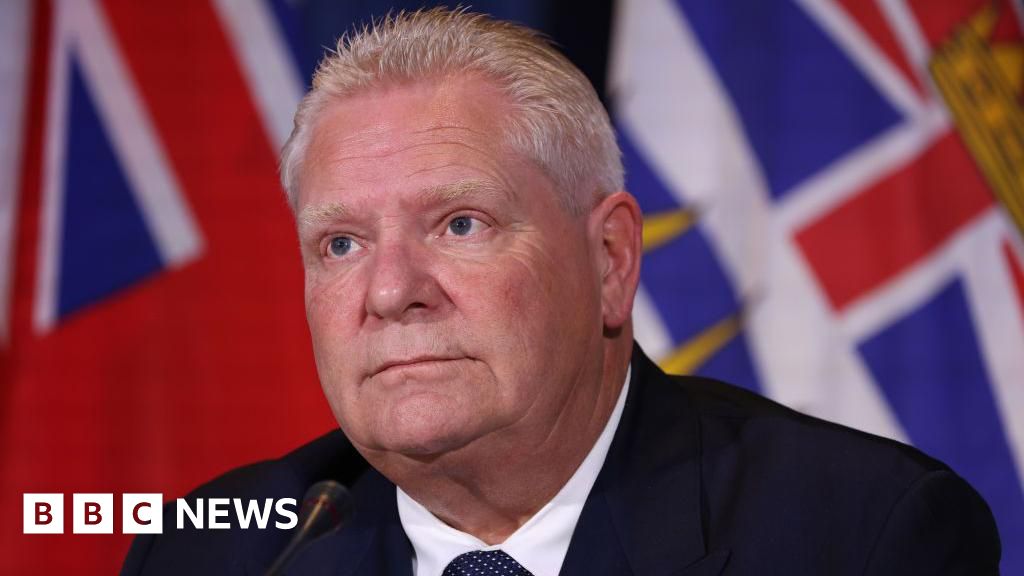Ontario Premier Doug Ford has announced that his province will pause its controversial anti-tariff advertisement campaign airing in the United States, a move aimed at reopening stalled trade negotiations between Canada and the US. The decision follows a phone conversation between Ford and Canadian Prime Minister Mark Carney, with Ford stating that the ad would be paused starting Monday to create space for trade talks to resume. Despite the planned pause, the advertisement will continue to air over the weekend on US networks, including during high-profile broadcasts such as the Major League Baseball World Series games.
The advertisement, funded by the Ontario government, had drawn sharp criticism from US President Donald Trump. The ad features excerpts from a 1987 national radio address by former US President Ronald Reagan, a revered figure in American conservatism, highlighting Reagan’s message that tariffs "hurt every American." However, the timing and tone of the ad provoked a strong reaction from Trump, who described the campaign as “FAKE” and “egregious” in a post on his social media platform, Truth Social. Trump’s response included the abrupt announcement that trade talks between the two countries were “HEREBY TERMINATED.”
Compounding the controversy, the Ronald Reagan Foundation issued a statement condemning the Ontario government’s use of the former president’s remarks. The foundation accused the ad of using “selective” audio and video clips that misrepresented Reagan’s original message and noted that Ontario had not sought permission to use the material. This criticism added a layer of diplomatic tension to an already strained situation.
Ford defended the advertisement's intent, emphasizing that it was designed to spark discussion about the kind of economy Americans want to build and how tariffs negatively affect both countries. “We’ve achieved our goal, having reached US audiences at the highest levels,” Ford said, suggesting that the ad succeeded in drawing attention to the issue. Nonetheless, the ad became a flashpoint in broader debates within Canada about the best approach to handling trade relations with the US under the Trump administration.
The Canadian government, led by Prime Minister Mark Carney, has pursued a more conciliatory and diplomatic path in attempting to resolve the tariff disputes, favoring direct, friendly engagement with the US president. Carney has held multiple face-to-face meetings and exchanged text messages with Trump in hopes of smoothing relations and reaching a trade agreement. Canada remains the only G7 country without a new trade deal with the US since Trump began implementing sweeping tariffs.
The tariffs imposed by the US have been particularly damaging to Ontario’s economy, given the province’s heavy reliance on the auto manufacturing sector. While a 35% tariff on all Canadian goods was introduced, most products remain exempt under existing free trade agreements. However, targeted tariffs have been applied to specific sectors, including a 50% levy on Canadian metals and a 25% tariff on automobiles. These sector-specific tariffs have hit Ontario hard, as the region houses the bulk of Canada’s automotive industry.
Prime Minister Carney has worked for months to negotiate relief from these tariffs, understanding that approximately 75% of Canadian exports are sold to the US, making Canada’s economy highly sensitive to trade disruptions. His approach has been characterized by caution and patience, contrasting sharply with Ford’s more confrontational stance.
Ford has taken several aggressive steps in response to the tariffs and what he perceives as unfair treatment of Ontario industries. These measures have included removing US liquor products from Ontario store shelves and threatening to withhold energy exports to the US. Ford’s rhetoric has been defiant, notably when he expressed frustration over car manufacturer Stellantis’s decision to shift some production from Brampton, Ontario, to the United States. “We need to fight back,” he declared, signaling his readiness to adopt a tougher posture.
The advertisement campaign was launched shortly after Ford's public statements and was part of his broader strategy to pressure the US administration and raise awareness among American consumers and policymakers. However, Trump’s harsh reaction and the subsequent cancellation of trade talks have sparked debate within Canada. Critics argue that Ford’s combative approach may have done more harm than good, detracting from Canada’s efforts to maintain a constructive dialogue with its closest trade partner.
Mahmood Nanji, a fellow at the Ivey Business School at Western University and a former associate deputy finance minister in Ontario, characterized Trump’s termination of talks as unsurprising, pointing out that the US president’s social media posts often contain hyperbole and theatrics. Nanji suggested that while some Canadians might appreciate Ford’s defense of Ontario’s

